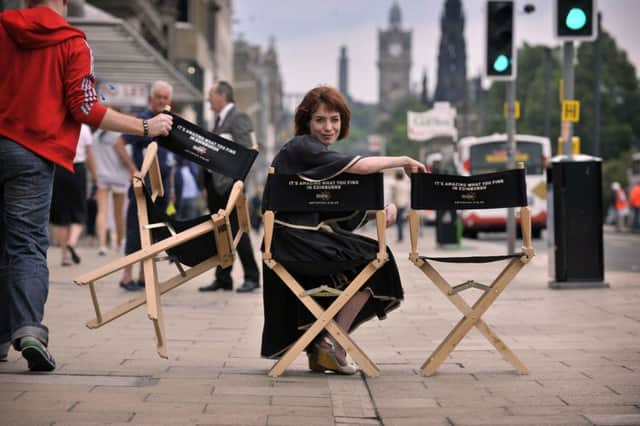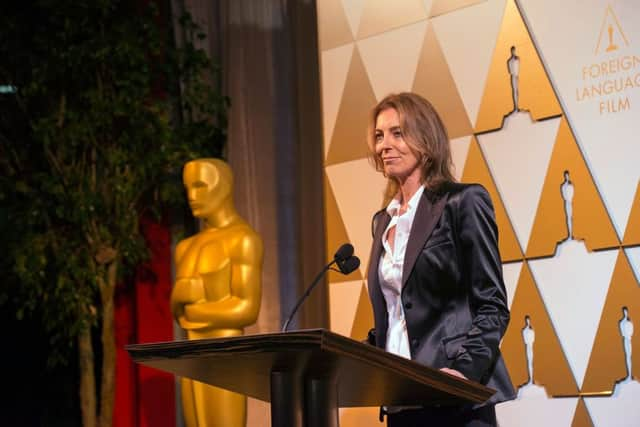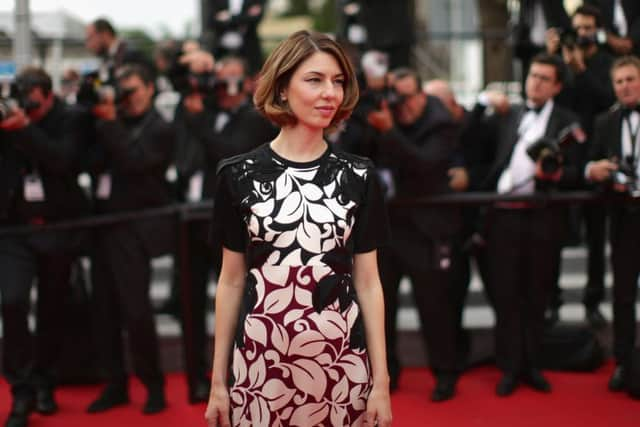Hannah McGill: Women in the frame at film festival


For 12 days, much of the world’s film industry will have cause to turn its eyes to Edinburgh, as the 69th Edinburgh International Film Festival opens its doors on Wednesday. As well as being a stage for new films both glitzy and gritty, and for the revival of classic titles, EIFF has always been a forum for debate about the current state of all things cinematic.
One subject always sure to stir strong opinions is the position of women in the film industry. EIFF has historically been active in this area; it held a Women’s Film Festival as far back as 1972, and unlike many significant film festivals, has had a number of female artistic directors, including Lynda Myles, Lizzie Francke and this correspondent. This year, under new AD, Mark Adams, representation of female talent is strong, and numbers have been crunched to prove it: 26.7 per cent of the festival’s new feature films have been directed or co-directed by women; over half have at least one female producer; one in three has a female screenwriter.
Advertisement
Hide AdAdvertisement
Hide AdBut why are such nearly-there numbers an innovation – and why aren’t they replicated or bettered in the wider world of more commercial and mainstream filmmaking? Just what stands in the way of more women making filmmaking their career? Why did it take until 2010 for a woman – Kathryn Bigelow – to win the Academy Award for Best Director? Is it ingrained injustice or a fair fight that women who aren’t Bigelow, Sofia Coppola, Jane Campion or a handful of others just happen to keep on losing…?


Warrington-born Helen Walsh is the author of four bold, clever and confronting novels, including Brass and The Lemon Grove, who now awaits the world premiere her debut film, The Violators, at EIFF. “There’s no denying that sexism is endemic in the film industry,” she says, citing not only “the casual and institutionalised objectification of female actors”, but also the habitual shuffling aside of women from creative command into secondary or organisational roles.
None the less, Walsh is ambivalent about how much gender matters once a women gets into the director’s chair. “We all bring our own narratives and baggage to the creative process,” she says. “I’m a mixed-race, working class, northern female – and for me, class and my sense of place shape and inform my attitude on set much more than my gender or race.” Still, she became aware of a possible difference in approach during the making of The Violators, when she shot a difficult sex scene with her young female lead, Lauren McQueen. “I was told by my crew that a male director would not have spent so much time making sure that Lauren felt safe and secure,” she says. “Maybe that is a gendered thing. But the moment I step behind the lens, I cease to be a feminist, a mother, a woman – I am interested only in realising the scene or the image in my head.”
Celebrated British director Carol Morley worked with a more than usually gender-balanced crew on her recent film The Falling, and also received interesting feedback. “I was working with cast and crew that have been on a lot of film sets,” she says, “and there were comments such as, ‘there’s a lovely atmosphere on set’ and ‘the dynamic is very different than usual’. I felt comfortable in a room that had a lot of female crew in it. Everyone liked it. It was beneficial to all.”
The convention that women generally lack the aggression or assertiveness needed in a cutthroat industry is open to question – as is the notion that force is always the best approach. “There are many ways of taking creative control,” Morley argues, “and I think that the skills women develop to get through life can be very valuable on a film set.”


British director Rosa Rogers will show Pirates Of Salé, a documentary portrait of a Moroccan street kids’ circus troupe which she co-directed with Merieme Addou, in this year’s EIFF. She thinks that women’s strengths can be misunderstood. “Women often explore the ideas they have with the team around them as they work, responding to ideas and changes that come up during filming,” she says.
While this flexibility can be a positive advantage – particularly in documentary-making, which often requires swift adjustment of plans – it can be perceived as a lack of decisiveness. And the judgment of largely male crews can loom large for the inexperienced. “When I started out, I often felt as though they were waiting for me to slip up – which, true or not, had an impact on my confidence.” Rogers and Addou also experienced unexpected advantages whilst shooting Pirates Of Salé. “In Morocco, it’s almost unknown to see a female crew. This actually helped us in terms of getting access to people’s homes and personal lives. We were seen as less of a threat than a male crew would have been; people opened up to us more.”
Amy Berg was Oscar-nominated in 2007 for Deliver Us From Evil, a film on sex abuse in the Catholic church. Her new documentary, Prophet’s Prey, about the disgraced fundamentalist Mormon leader, Warren Jeffs, screens at EIFF; as does her fiction film debut, Every Secret Thing, a crime drama starring Elizabeth Banks. Berg will also chair the festival’s International Jury. She senses that being underestimated can itself provide a certain stimulus. “As women, we have been socialised from birth to feel like our opinion is secondary or of less importance than men,” she says. “We live in a world where it’s okay for a woman to be a muse, rather than an artist in our own right. Despite these barriers, we continue to make art. I think for many women, this dissonance and stereotype actually fuels our work.”
Advertisement
Hide AdAdvertisement
Hide AdOnce you get there, however, you’d better be better than the nearest bloke if you want another chance. “There is more pressure on women because our work is often considered a reflection on all female directors,” Berg notes.
Edinburgh-based filmmaker Hope Dickson-Leach is in no doubt: “There is a lack of cultural support for women’s films full stop, and that needs to change.” Currently working on her first feature film, The Levelling, Dickson-Leach had her interest in filmmaking sparked by an early job at EIFF, and she subsequently studied film at Columbia University. While that context provided inspiration and role models – “over half of our class were women, and Columbia began the careers of Kimberly Peirce, Nicole Holofcener, Lisa Cholodenko and Kathryn Bigelow, so there was a culture of female directors being successful” – she does not see such encouragement replicated in the wider industry. “Women’s stories aren’t as prevalent on screen, compared to say, literature,” says Dickson-Leach, “and while this should mean there is a gap which people want to fill, in actual fact the opposite is true. Films cost a lot of money to make, and people who make the decisions want reassurance that their money is coming back. They want precedents; they are heavily risk averse.”
Some might contend, of course, that this is the way it is: filmmaking’s a tough gig, and if more men can hack it than women, so what? Plenty of films are still getting made. What identifiable benefits does Dickson-Leach think that greater parity would bring? “If we go back to the beginning and ask what art is for – or why we watch and love films – then it is hard to argue against the need for diversity,” she says firmly. “We love to see our own stories on screen. We love to learn about other cultures and see different viewpoints.”
Australian journalist and film critic, Julie Rigg, has been a leading observer of and commentator on women in film for more than 20 years. She agrees that wider representation by women at the directorial level is a simple matter of fair representation, as well as one of creative enrichment. “Because we have different life experiences, women do see the world differently at times,” she says. “I do think the industry should have some sort of goal towards parity. The argument is the same as the cultural arguments for a national cinema: we should have the chance to tell our own stories. But one thing I do know is that the hours are horrendous – on a shoot, and afterwards in post. Which is a real problem for women who decide to have children. While the stars and child actors can negotiate child care, nannies, tutors etc, as part of contracts, the other cast and crew are rarely able to do so. A woman director needs a very understanding and flexible partner. Male directors – and crew – just expect their partners to take the load, and they do.”
And here’s a very major rub. As in many industries, women who want children are likely to be starting a family just as they are gaining skills and influence; and even more than in most industries, film thrives on a culture of poorly recompensed overwork.
Child-rearing isn’t necessarily a one-woman show, of course, and parenting puts pressure on male creators too; but however helpful their partners are, pregnancy, birth and the recovery afterwards interrupts a mother’s progress in a field which owes much to who you know, where you’re seen and how available you are.
Dickson-Leach’s experiences as a mother of two have inspired her to set up the online group, Raising Films, for those trying to combine parenting with a filmmaking life. “We want it to evolve into something that will facilitate change,” she says, “but it began as a search for support. Being a parent is such a mind-blowing experience and trying to navigate a creative career at the same time is incredibly hard. I know lots of mothers who take the time off to invest their energies into their families, and more power to them. But if the industry is turning away pools of talented women just because they can’t pay people for doing their work, then that is something that the industry should be ashamed of. It’s time we valued our workers for their work and the richness that their lives bring to the screen.”
The next big festival in the UK calendar after EIFF is the BFI London Film Festival in October. “Last year, I was thrilled to be able to say that we had 54 feature films directed by women in the BFI London Film Festival selection,” says its director, Clare Stewart, “but that was still only 22 per cent of the programme.” She points out that the UK is actually ahead of much of the rest of the world in terms of women directing feature films – but that figure is still only 14 per cent. As to why it matters she says: “Aside from a commitment to the idea that women should have equal opportunity to direct films, having women behind the camera does seem to result in more positive and varied female-led stories and roles. Of course, there are plenty of men who create and direct strong female characters, and there are great women directors who are insightful creators of male characters. But it does seem true that women directors in general are more committed to strong and diverse roles and stories, and also understand that there is a genuine audience appetite to see a more progressive representation of women and girls.”
Advertisement
Hide AdAdvertisement
Hide AdStewart’s festival will open on 7 October this year with Suffragette, written by Abi Morgan, produced by Alison Owen and Faye Ward and directed by Sarah Gavron. How, against the odds, did those women succeed in mounting a major movie fronted by Meryl Streep, Carey Mulligan and Helena Bonham Carter? “They had a story they were impassioned to tell,” says Stewart. “They are empowered by their subject. And women can be great filmmakers – of course. It just seems like they have to fight harder than men (like the suffragettes) to claim that space. That definitely fuels my interest in selecting it for opening night… that, and the fact it is one of the year’s most significant and special films.” «
• Hannah McGill was artistic director of the Edinburgh International Film Festival from 2006 to 2010. The 2015 festival opens on Wednesday
Twitter: @HannahJMcGill